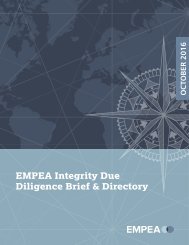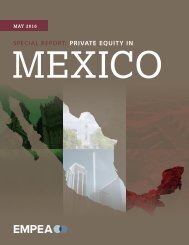You also want an ePaper? Increase the reach of your titles
YUMPU automatically turns print PDFs into web optimized ePapers that Google loves.
Because <strong>of</strong> the fragmented nature <strong>of</strong> African financial markets, it remains very difficult to access information<br />
on the state <strong>of</strong> stock or bond market development in particular countries. Over time, as private investors<br />
demand such information as they do routinely in developed capital markets, the private sector will provide the<br />
information the market needs; but while markets remain underdeveloped, there is limited incentive for the likes<br />
<strong>of</strong> Bloomberg or Thomson Reuters to fill the gap.<br />
It is also the case that incumbents benefit from opaque markets and so are reluctant to support initiatives that<br />
shine a light into parts <strong>of</strong> the markets that they would consider to be their own.<br />
Skills development<br />
Many Sub-Saharan African markets are now pr<strong>of</strong>essionalising in the sense that regulators are demanding<br />
minimum pr<strong>of</strong>essional standards based on globally recognised pr<strong>of</strong>essional qualifications. FSDA is supporting<br />
this process by encouraging adoption <strong>of</strong> the Chartered Institute for Securities & Investment’s certifications,<br />
adapting to local contexts where necessary. This is an important development which will also strengthen<br />
investor confidence.<br />
Skills gaps exist all along the investment finance chain. As has already been mentioned, skills need to be<br />
strengthened in regulatory agencies. A number <strong>of</strong> the issues papers in this report point to the need to strengthen<br />
skills in private equity and asset management. Market practitioners require training not just in technically<br />
advanced areas such as derivatives but in some quite basic areas such as valuation. Pension fund trustees<br />
also need technical training—for example, not just to understand the benefits <strong>of</strong> investing in alternative assets<br />
such as private equity, but also fundamentals around the private equity limited partnership model, the J-Curve’s<br />
impact on short-term performance, and the asset class’s liquidity pr<strong>of</strong>ile.<br />
It is not just financial or technical skills where support is needed, however. There is also a dearth <strong>of</strong> leadership<br />
and broad management skills in the financial sector in many African countries. One <strong>of</strong> the papers in this report<br />
also points to the need for financial centres to market themselves effectively to international investors. This is<br />
also a skills issue.<br />
The current culture in financial markets in Africa is such that private entities routinely underinvest in skills<br />
development. Donors can help fill this gap by providing financial support for systemic interventions (such as<br />
the development <strong>of</strong> certification systems) as well as technical and management training (preferably on a costshare<br />
basis and preferably involving local training institutions such as business schools). The paper by Michael<br />
Fuchs also argues that it may be worthwhile to subsidise private equity funds in order to make the expertise <strong>of</strong><br />
fund managers more accessible to SMEs.<br />
Considerable effort needs to be made to work with training delivery techniques that could be more effective<br />
than classroom-based approaches whose track record has been quite disappointing.<br />
Subsidy<br />
There may be circumstances in which it may be justified to use donor funding for financing investments. Donor<br />
agencies will each have their own rules as to when it is appropriate to intervene in markets but, typically,<br />
subsidy can be justified (i) for demonstration purposes—for example, to trial a new product; or (ii), to crowd in<br />
third-party capital—for example, through the use <strong>of</strong> “first loss” instruments or tiered capital structures.<br />
It is <strong>of</strong>ten said that African capital markets are not particularly innovative. Donors could help to catalyse the<br />
development <strong>of</strong> new investment products by supporting product design processes, and underwriting the public<br />
issuance <strong>of</strong> new kinds <strong>of</strong> product.<br />
More controversially, donors could support market intermediaries, the dealmakers who have the skills,<br />
networks and incentives to create investment transactions. African capital markets do not have a culture <strong>of</strong><br />
<strong>Conduits</strong> <strong>of</strong> <strong>Capital</strong> – Onshore Financial Centres and Their Relevance to African Private Equity<br />
| 9





